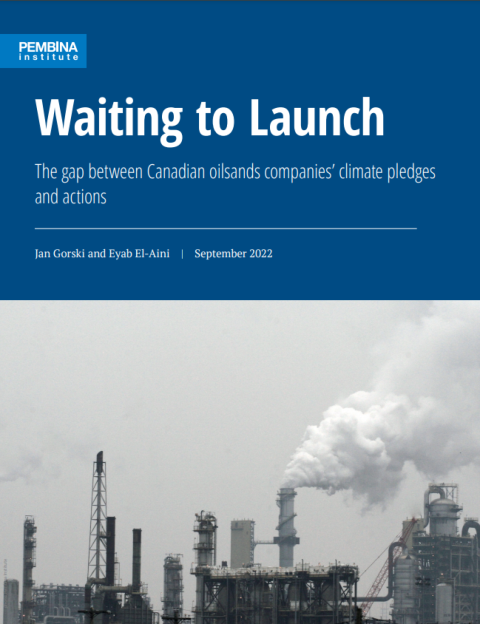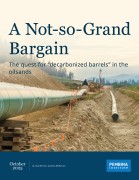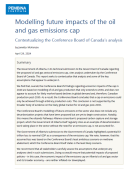It has been over a year since the Pathways Alliance, an industry grouping representing some 95% of production in Canada’s oilsands, announced its three-phase plan to get oilsands operations to net-zero greenhouse gas (GHG) emissions by 2050. Although Pathways has successfully generated interest and coverage among industry and industry-watchers (including government and media) about its ability to help meet Canada’s 2030 and 2050 emissions reduction targets, most details of its plans remain undisclosed, and since it was established there have been no significant decarbonization investment decisions made by its members.
Canadian oil and gas companies’ free cashflow is estimated to reach $152 billion in 2022. This is the highest level of profits the industry has ever seen. However, for the first time, this boom is not being accompanied by new projects in Alberta’s oilsands sector, or a significant expansion of jobs. It is also not being invested in decarbonization efforts to align with the Pathways pledges. Instead, companies are prioritizing short-term shareholder value in the form of share repurchases and dividend payments. Companies across Canada’s energy sector now have historically low levels of capital expenditure as a percentage of their free cashflow.
By 2030, Canada’s oil and gas sector will be subject to intensifying global competition for low-emissions energy. This competition will be further exacerbated by long-term global oil demand outlooks indicating that demand for oil will decline by 2030, a trend identified even by oil firms. Companies that make deep and rapid emissions reductions now will be best-placed to prosper in the low-emissions, high-competition worlds of 2030, 2050 and beyond. Those that do not risk leaving behind significant underfunded financial and environmental liabilities — such as cleanup of the tailings ponds. To ensure that Albertans and Canadians do not pay the price for this in the long term, the members of the Pathways Alliance must avoid any further delay in making investment decisions and transforming their climate promises into reality.
In summary, we recommend that oilsands companies take the following steps:
- Respond constructively to the federal government's plans to implement an oil and gas sector emissions cap, which will provide additional long-term certainty for companies regarding government's (and Canadians') expectations about the need for the sector to rapidly decarbonize operations. The Government of Canada can contribute to this certainty by clearly communicating to industry that no further public funding will become available.
- Provide more detailed plans and advance to final investment decision on CCUS projects, which could include naming the facilities and locations where carbon will be captured, and outlining the extent to which each Pathways member's CCUS investment will contribute to the collective emissions reduction target.
- Provide further detail on the range of other decarbonization measures (for example, process improvements, energy efficiency, and electrification) included in the original Pathways plan, such as how these measures will be shared amongst the Pathways members, and how the GHG reduction target will be split amongst these measures. We would also expect progress on the implementation of these measures to be rapidly accelerated.
In taking the above steps, the Pathways Alliance and its member companies can provide reassurance to Canadians that they acknowledge their sector’s crucial role in Canada achieving its international emissions reduction commitments. In doing so, the oilsands industry can begin to make a meaningful contribution to this country’s efforts to leading the fight against the most disastrous effects of global warming and climate change, while also making essential future-proofing investments to protect their own operations.










